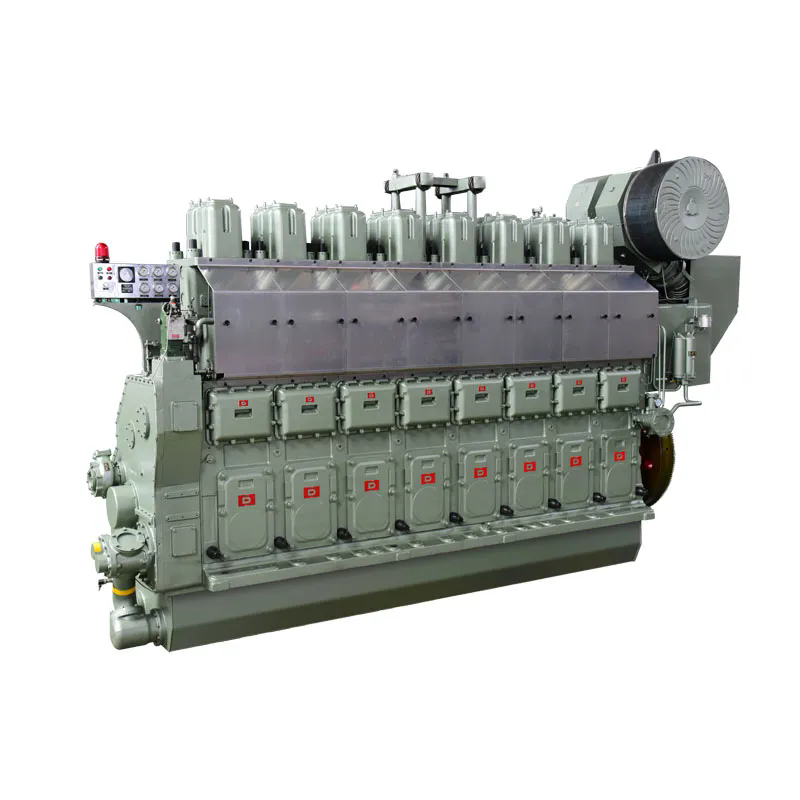Marine Diesel Engines: Powering the Future of Maritime Transport
2024-08-28
Marine diesel engines are the heart of the modern maritime industry, driving everything from small pleasure boats to massive container ships. Renowned for their durability, efficiency, and power, these engines play a critical role in global trade and transportation. In this blog, we’ll explore the fundamental aspects of marine diesel engines, their benefits, applications, and future developments.
What are Marine Diesel Engines?
Marine diesel engines are internal combustion engines specifically designed to power marine vessels. Unlike gasoline engines, which use spark plugs to ignite the fuel-air mixture, diesel engines rely on compression ignition. This means that the fuel is ignited by the heat generated from compressing the air in the engine’s cylinders. Marine diesel engines are known for their robust construction, high torque output, and fuel efficiency.
Key Features of Marine Diesel Engines
1. High Power Output: Marine diesel engines are designed to deliver high power, necessary to propel large ships and handle demanding marine environments. They provide the necessary thrust to move vessels efficiently through water.
2. Durability and Reliability: Built to withstand harsh marine conditions, these engines are engineered for durability and long-term reliability. They are constructed with heavy-duty materials to resist corrosion and wear from saltwater exposure.
3. Fuel Efficiency: Diesel engines are more fuel-efficient compared to gasoline engines. Their high compression ratios allow them to extract more energy from the fuel, making them ideal for long voyages and heavy loads.
4. Low Maintenance: Marine diesel engines generally require less frequent maintenance compared to other types of engines. Their robust design and efficient fuel use contribute to lower overall maintenance costs.
5. Emissions Control: Modern marine diesel engines are equipped with advanced emissions control technologies, such as turbochargers, intercoolers, and aftertreatment systems, to meet environmental regulations and reduce pollutants.
Benefits of Marine Diesel Engines
1. Cost-Effective Operation: Diesel fuel is often more cost-effective than gasoline, making marine diesel engines a more economical choice for powering ships and boats. Their fuel efficiency also translates into lower operating costs over time.
2. Enhanced Performance: With high torque and power output, marine diesel engines provide excellent performance for various marine applications. They are capable of handling large loads and navigating challenging conditions.
3. Long Lifespan: Due to their robust construction, marine diesel engines tend to have a longer lifespan compared to other types of engines. Their ability to withstand harsh conditions contributes to their longevity and reliability.
4. Reduced Fuel Consumption: The efficiency of diesel engines leads to reduced fuel consumption, which is especially important for long voyages and commercial operations where fuel costs can be significant.
5. Safety: Diesel engines are generally safer than gasoline engines, as diesel fuel has a higher flash point and is less likely to ignite under normal operating conditions. This enhances safety on marine vessels.
Applications of Marine Diesel Engines
1. Commercial Shipping: Marine diesel engines are widely used in commercial shipping, powering container ships, bulk carriers, and oil tankers. They are essential for transporting goods and commodities across the globe.
2. Fishing Vessels: Diesel engines power a variety of fishing boats and trawlers. Their reliability and efficiency are crucial for the demanding operations of commercial fishing.
3. Passenger Ships and Ferries: Marine diesel engines are used in passenger ships and ferries to provide reliable power for transporting people and vehicles across water bodies.
4. Naval Vessels: Military and naval vessels rely on marine diesel engines for their power needs. These engines are designed to meet the rigorous demands of naval operations and provide dependable performance.
5. Recreational Boats: Diesel engines are also found in recreational boats and yachts. Their fuel efficiency and durability make them a popular choice for leisure and sport applications.
Future Developments in Marine Diesel Engines
1. Environmental Regulations: As environmental regulations become stricter, marine diesel engines are evolving to meet new standards. Innovations such as hybrid systems, cleaner fuel options, and advanced emissions control technologies are being developed to reduce the environmental impact.
2. Efficiency Improvements: Ongoing research aims to improve the efficiency of marine diesel engines further. Innovations such as variable geometry turbochargers and advanced combustion techniques are being explored to enhance performance and fuel economy.
3. Alternative Fuels: The marine industry is exploring alternative fuels, such as LNG (liquefied natural gas), hydrogen, and biofuels, to reduce reliance on traditional diesel and decrease emissions.
4. Digitalization and Automation: The integration of digital technologies and automation is transforming marine diesel engine operation. Advanced monitoring systems, predictive maintenance, and remote diagnostics are improving efficiency and reducing downtime.
5. Decarbonization: The push towards decarbonization is driving research into low-emission technologies and alternative propulsion systems. Marine diesel engines will likely see advancements that align with global efforts to reduce greenhouse gas emissions.
Tips for Maintaining Marine Diesel Engines
1. Regular Inspections: Perform regular inspections and maintenance to ensure the engine is operating efficiently. Check for signs of wear, leaks, and other issues that may affect performance.
2. Proper Lubrication: Ensure that the engine is properly lubricated with the correct type of oil. Regularly check and change the oil as per the manufacturer’s recommendations.
3. Fuel Quality: Use high-quality diesel fuel and add fuel additives if necessary to prevent fuel-related problems. Regularly check the fuel system for contaminants and ensure proper filtration.
4. Cooling System Maintenance: Keep the cooling system in good condition to prevent overheating. Regularly check and clean the heat exchanger and ensure the coolant levels are adequate.
5. Monitor Performance: Use monitoring systems to track engine performance and detect any anomalies early. Address any issues promptly to prevent costly repairs and ensure reliable operation.
Conclusion
Marine diesel engines are integral to the maritime industry, offering powerful, reliable, and efficient performance for a wide range of applications. Their robustness, fuel efficiency, and adaptability make them an ideal choice for powering vessels in various marine environments. As the industry evolves, marine diesel engines are expected to continue advancing with new technologies and innovations that address environmental challenges and improve operational efficiency. Whether you’re involved in commercial shipping, recreational boating, or naval operations, understanding the benefits and future developments of marine diesel engines can help you make informed decisions and optimize your maritime operations.



